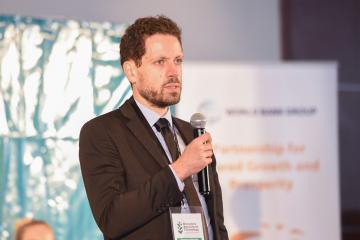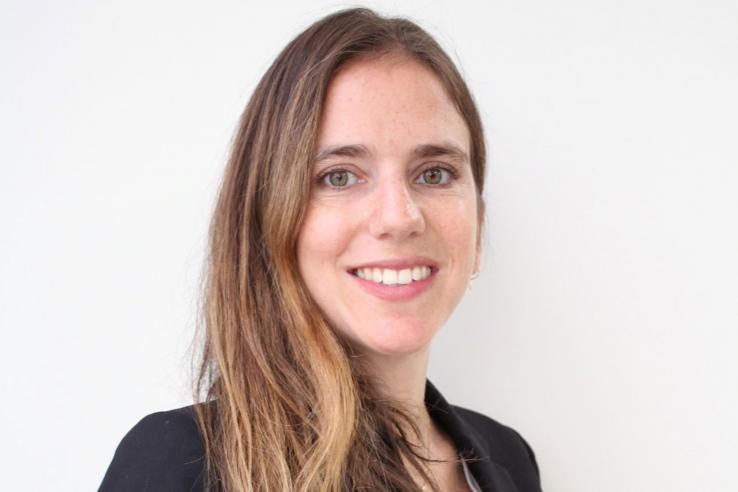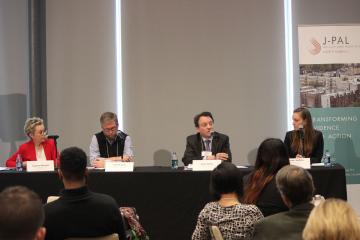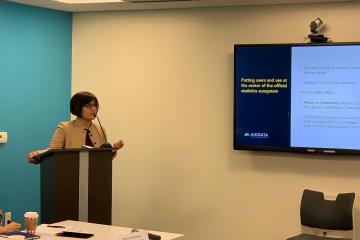
Amanda Dawes Ibáñez, J-PAL ‘14, is at the nexus of research and policy design

The Alumni Spotlight series highlights J-PAL alumni who are making an impact across industries and around the world. To nominate a J-PAL alum to be featured in a future Alumni Spotlight, please fill out this form.
In this installment of our Alumni Spotlight series, we caught up with Amanda Dawes Ibáñez, a former senior research manager at J-PAL Latin America & the Caribbean (LAC). Amanda joined J-PAL LAC during its earliest years and led the development of many foundational research partnerships and projects. Now the head of the social policy division at the Ministry of Social Development in Chile, Amanda is leading an effort to rethink Chile’s social policy ecosystem and integrate evaluation into program design.
Could you start by telling us about what drew you to J-PAL LAC, and what you worked on while there?
I first learned about J-PAL through my advisor at university, Pancho Gallego—the Scientific Director of J-PAL LAC—who invited me to participate in this work. I joined at an exciting time—the office was very, very new, having been founded less than two years prior.
My main job was to get new research projects started. This meant that I got to dive deep into research design: I loved becoming an expert in a topic, understanding what the questions were and developing new ones, considering possible interventions and whether they were feasible to evaluate, talking to lots of different partners, etc. It’s a very creative process!
It’s also a challenging process—take partnership development as an example. You need to understand your partner’s goals and find common points between the investigation’s objectives and the partner’s needs. It can be a bit frustrating to spend so much time designing ten projects only to have one ultimately work out, but the best part of the process to me was always this design phase.
You began as a research analyst at J-PAL LAC but achieved the position of senior research manager by the time you left. Can you tell us about how your role evolved over the years?
As an analyst I had a lot of fun diving deep into a variety of topics. As I became a manager, my role became more complicated—it was more about overseeing several projects at a time and making sure that they were progressing as they should, at a high level of quality. This meant having to manage teams, schedules, budgets, expectations, and stakeholders, to name a few.
When I became a senior research manager, I had to oversee all of the projects and make sure they were meeting J-PAL standards. Another significant part of my role was working with the primary investigators and J-PAL directors to make sure that all of our work across the research, policy, and training teams was linked; while at the same time making sure we were providing the highest-level support to affiliates.
I loved being in the position to really understand the projects and identify their challenges. But the best part of working at J-PAL LAC was the people. All of my colleagues on the Chile team are very passionate people and dedicated to doing the best possible work. I keep on running into them in different parts of the world, and even different ministries in Chile! I look back and think about what a privilege it was to work with such incredible people. My conversations with them were some of the most enriching that I’ve ever had.
Like many J-PAL alumni, you brought your research and policy talents to a government development agency. Could you tell us about your current role in Chile’s Ministry of Social Development? What are some projects you are working on now?
I find my role now to be absolutely fascinating. The Ministry plays a coordination role between all other social ministries to ensure that Chile’s social policies are coordinated, well designed and well evaluated, and make sense for our beneficiaries. There are two main functions within my division: monitoring and evaluation, and the design of social policy and targeting instruments.
For the former, I’m thinking about how we can map Chilean social policies to understand not only what each program is doing individually, but what the combination of programs is doing for one person or one issue.
We've started linking the ex-ante, monitoring, and ex-post stages of evaluation so that all the program information flows into the impact evaluation process. Ryan Cooper, the former executive director of J-PAL LAC, heads up program impact evaluation at the Ministry of Finance—it’s been great to work closely with him to build an evaluation component into programs as they are created, so that he can do an impact evaluation down the line.
Within Chile, we have one of the biggest linked databases of social information in existence, comparable to those of New Zealand, Australia, and some Nordic countries. We use this rich information to identify the people that we should be prioritizing for our programs, and help other ministries and counties use the database to identify beneficiaries for their own programs. The impact of a program depends a great deal on being able to reach the right individuals and families, so doing that efficiently has a huge impact.
The database is highly protected to ensure the privacy of our beneficiaries. Given the database’s potential to help us answer important social policy questions, we built a system that allows academics to use it safely, ethically, and with respect for individual privacy, in collaboration with the Ministry. Having a J-PAL background, I had a better idea of how academics work and how to find a way to bring researchers and the government together to generate evidence.
Finally, the other thing I do is design social policy. For example, last year the government drafted a law that gives a subsidy to low income workers. We had to figure out how much it should be, who it should reach, who will deliver it, etc. It's a very intellectual exercise, and it helps to have a very strong J-PAL training in understanding different settings and having a good awareness of the literature.
The Ministry of Social Development of Chile has partnered with J-PAL on several occasions. Since joining the Ministry, what have you learned about keys to successful government/researcher partnerships?
It’s crucial to understand what everyone is looking for in the project. Recognize upfront that both government and researchers want to contribute to finding the right answers, and that each has their own needs. For example, academics need freedom—for good reason—to publish results regardless of what an evaluation reveals, and they also often need more time so that their papers can go through the academic review process. At the same time, governments often need answers within a shorter timeframe and have more practical questions that may be less interesting to an academic. A successful research partnership takes into account the needs of both entities so that the project can be designed accordingly.
Related Content

Emmanuel Bakirdjian, J-PAL ‘17, uses evidence to help farmers increase agricultural yield across East Africa

Kristen Watkins, J-PAL ’19, is helping shape upward mobility research in the United States



